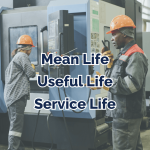
Note: This first article in the NoMTBF campaign was published on April 1st, 2009. Thus, we’ve been at this and making progress for a long time and come a long was since starting the NoMTBF campaign. I am looking forward to your comments, contributions, and suggestions.
Fred
At first, MTBF seems like a commonly used and valuable measure of reliability. Trained as a statistician and understanding the use of the expected value that MTBF represented, I thought, ‘Cool, this is useful.’
Then, the discussions with engineers, technical sales folks, and other professionals about reliability using MTBF started. And the awareness that not everyone, and at times it seems very few, truly understood MTBF and how to properly use the measure.
[Read more…]













 Ask a question or send along a comment.
Please login to view and use the contact form.
Ask a question or send along a comment.
Please login to view and use the contact form.